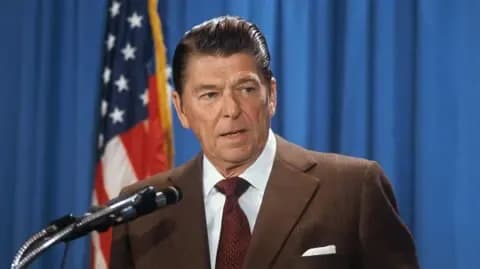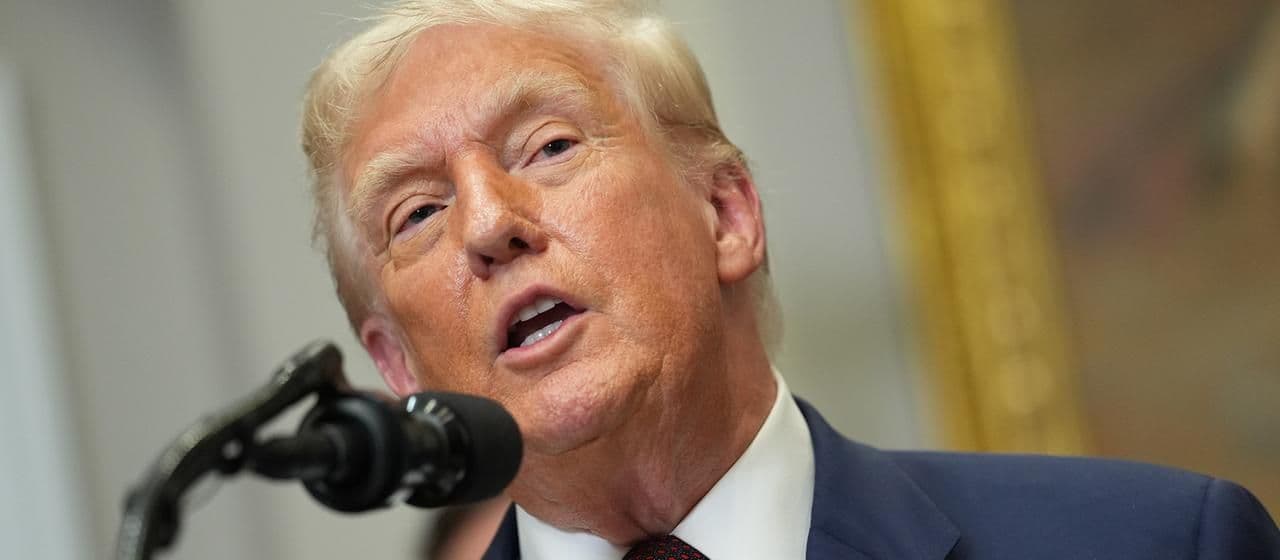When Icons Clash: Reagan's Ghost and the High Stakes of Trump's North American Trade War
Explore how Reagan's legacy fuels Trump's tariff battles with Canada. Unpack the political theater, legal stakes, and future of North American trade.

The Spark That Ignited a Firestorm: Ontario's Ad and the Fallout
A seemingly innocuous advertisement, launched by the province of , recently ignited a diplomatic firestorm, abruptly terminating US-Canada trade negotiations. , a vocal critic of the US border taxes, spearheaded an advertising campaign in early October, featuring the resonant voice of former US President . The minute-long advert, narrating over imagery of the New York Stock Exchange and cranes adorned with both US and Canadian flags, quoted Reagan's assertion that tariffs 'hurt every American worker.' This was a direct response to the escalating tariffs, initially 25% and later hiked to 35% in August, on a broad range of Canadian goods including timber, steel, aluminum, and cars. Ontario, as Canada's most populous province and largest regional economy, has borne the brunt of these levies, facing significant job losses and immense pressure on its businesses. , reacting with characteristic intensity on his Truth Social platform, denounced the ad as 'FAKE,' 'fraudulent,' and 'egregious behavior,' accusing Canada of attempting to interfere with upcoming US Supreme Court decisions on the legality of his global tariffs. This swift and furious rebuttal culminated in the immediate suspension of all trade talks, a move confirmed by Secretary of State , plunging the crucial bilateral economic relationship into uncharted territory.

Reagan's Shifting Shadow: Deconstructing a Legacy in the Tariff Debate
The Ontario ad's strategic deployment of image thrust the former president’s legacy into the heart of a contentious modern trade dispute. Premier campaign leaned on Reagan’s perceived advocacy for free trade, positioning Canada as a victim of protectionist policies. However, a deeper look at the 1987 'Address to the Nation on Free and Fair Trade,' from which the clip was drawn, reveals a more nuanced stance. Reagan, while generally a proponent of free trade, used that speech to explain tariffs imposed on specific Japanese goods as a 'special case,' steps he was 'loath to take' but deemed necessary to enforce existing agreements. He stressed his desire to lift them quickly to 'promote the prosperity and economic development that only free trade can bring.' Unsurprisingly, offered a starkly different interpretation, asserting that Reagan 'LOVED TARIFFS FOR OUR COUNTRY, AND ITS NATIONAL SECURITY.' The weighed in, calling the ad a 'misrepresentation' that used 'selective' audio, further muddying the waters and highlighting how historical figures can be selectively weaponized in contemporary political battles. This clash over Reagan's true economic philosophy underscores the potent emotional and ideological currents at play, far beyond simple policy debate.
Tariffs as a Political Lever: Beyond Economics to Nationalistic Theater
Beyond the historical debate over Reagan's legacy, tariff strategy against , and indeed globally, operates as a powerful political lever, transforming economic policy into nationalistic theater. His administration's 35% levy on Canadian imports, with specific penalties on metals and automobiles, isn't just about trade balances; it’s a public performance designed to assert American economic dominance and appeal to a domestic base. While exemptions were made for goods under the free trade agreement negotiated during his first term (), the current escalation showcases a willingness to disrupt established accords. This isn't the first instance of such brinkmanship; previously threatened to cease talks when Ottawa proposed a digital services tax on US tech firms, a move Canada eventually rescinded, leading the White House to declare Prime Minister had 'caved.' Such actions frame trade disputes not as complex negotiations, but as contests of will where one nation must 'win.' The rhetoric of Canada 'cheating' and engaging in 'egregious behavior' for an advertisement serves to rally support and justify aggressive measures, pushing economic discussions into the realm of national pride and perceived betrayal, often overshadowing the tangible economic pain inflicted on both sides.
The Unseen Battlefield: Supreme Court, Public Opinion, and Presidential Authority
Beneath the surface of public declarations and social media broadsides, a critical, unseen battle is unfolding: one centered on legal precedent, presidential authority, and the court of public opinion. claim that Reagan ad was a deliberate attempt to 'interfere with' US Supreme Court hearings, scheduled for November 5th, reveals the high stakes involved. These hearings represent the most significant challenge yet to his presidential authority regarding trade policy, potentially compelling the US to refund billions in collected tariffs. The swift condemnation of the ad as 'selective' and a 'misrepresentation,' coupled with their threat of legal action, lends credence to Trump's narrative of improper influence, regardless of the ad's actual intent. Meanwhile, the full context of Reagan’s 1987 speech, which included extensive warnings about how protectionism contributed to the Great Depression, offers a powerful counter-narrative that could sway public sentiment. This multi-front conflict highlights how modern trade disputes are fought not only at negotiating tables or through economic sanctions, but also in courtrooms, through media messaging, and by carefully managing public perception to bolster or undermine a president's power.
A Fractured Frontier: Navigating the Future of US-Canada Economic Ties
The abrupt termination of trade talks casts a long, uncertain shadow over the future of US-Canada economic relations, an alliance typically characterized by deep integration and mutual benefit. With over three-quarters of Canadian exports flowing south of the border, representing some C$3.6 billion in goods and services daily, economy is exceptionally vulnerable to American protectionism. The current tariffs, particularly on steel, aluminum, and cars, have already resulted in job losses and significant business strain within Canada. As one commentator warned, 'High tariffs inevitably lead to retaliation by foreign countries and the triggering of fierce trade wars… markets shrink and collapse, businesses and industries shut down and millions of people lose their jobs.' This dire prediction looms large as Prime Minister expresses disappointment, yet faces a US administration seemingly unwilling to engage. Moreover, this bilateral dispute unfolds against a backdrop of broader global trade tensions, with also preparing for meetings with and Treasury Secretary engaging in talks with China's vice-premier. The Canadian frontier, once a model of collaborative economic partnership, now stands fractured, navigating a future where historical legacies are weaponized and economic policy is increasingly intertwined with nationalistic fervor, posing existential questions for international alliances.
Related Articles

The Fentanyl Factor: Unpacking Trump's Latest Tariff Play Against Canada

The Fentanyl Factor: Unpacking Trump's Latest Tariff Play Against Canada

The Unpredictable Toll: Unpacking Trump's Differentiated Tariffs on Global Partners

The Unpredictable Toll: Unpacking Trump's Differentiated Tariffs on Global Partners

Trade Shockwaves: How Trump's Tariffs Reshaped Canada's Economic Compass

Trade Shockwaves: How Trump's Tariffs Reshaped Canada's Economic Compass

The Unfolding Trade Chessboard: Trump's Tariffs and the Global Response
